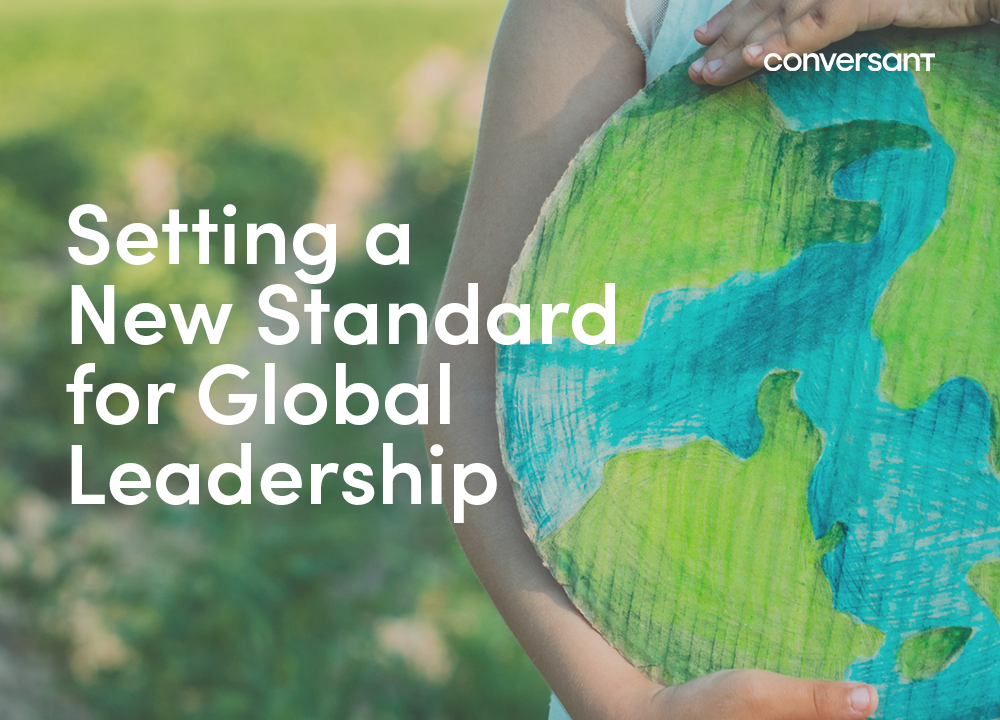As a global collective, we face a number of complex challenges: climate change, racial injustice, income disparity, and the gender wage gap to name a few. These are human challenges. They are also deeply systemic ones. Somewhere along the way, we seem to have forgotten that every organization, every business, is part of a bigger system. We are a global financial system, a global economy, a global ecology. All of us are interdependent. That means that the future of human rights, equality, and the planet is inseparable from the future of our organizations.
The business community has more influence on how the world will evolve from here than any other sector. In the last decade, sustainability, social impact, and diversity and inclusion have become part of business strategy, and yet too often these are promises left unfulfilled. They tend to fall under talent attraction or brand strategies more than purpose-driven business imperatives, but purpose and authenticity aren’t just ethical concerns, they’re critical to overall business success, and that relationship is getting harder for leaders to ignore. It’s why we need a reset in leadership now if we want both our organizations and our global systems to be healthy and sustainable.
Just as our organizations are part of interdependent systems, each of our businesses are systems themselves. Systems of people in partnership to accomplish something together—systems of people. At Conversant, we know that human connection is what fuels the work of business, yet it often gets ignored. The people that make our businesses possible are the very ones that get impacted by these social and environmental challenges. And as information flows across our networks faster and faster, business transparency is becoming more a fact than a choice. If we continue to neglect the relationship between our business, our people, and the world, there will be real consequences for all three.
In business and organizational life, we tend to fight against our humanness, forcing static systems and processes onto our people and forgetting that there is a ‘human operating system.’ In fact, we often don’t bother to stop and consider it. If people are the most essential element of our organizations, why doesn’t organizational leadership reflect that simple fact?
Historically, the model for leadership has followed this trend, opting for management practices that are inconsistent with the nature of being human. Somewhere along the way, leaders have forgotten that we are leading people and that the way we lead matters.
The pursuit of growth and strategic advantage without considering human needs for connection, purpose, and meaning is not just unbalanced, but unwise. It leads to an overwhelmed, exhausted, and uninspired workforce, and sometimes a toxic culture of resentment and distrust. That group of people can’t possibly be as innovative, collaborative, or engaged as our most important challenges need us to be.
People want to be treated like people. We long for purpose, to be part of a community, to make a meaningful difference. So, even though our culture has grown fond of using language like “human resources” to describe these aspects of business, we need to understand the design of how humans connect—and there is a design. If you understand that design, you can lead teams that cause a greater impact with less time, money, and stress… and more joy.
At Conversant, it is our vision to awaken the world to the power and joy of authentic human connection. We believe that if we design our systems and our leadership for what humans really need to thrive, our organizations will thrive, too. And so will our ability to impact our global system in meaningful ways.
It’s not uncommon to hear communication, collaboration, and connection regarded as “soft skills,” compared to other business practices that more directly serve the bottom line. I’d like to change that notion, reframing these soft skills as fundamental to leading the very people that contribute to our organizations’ success.
I have often talked about love as a leadership skill. My definition of love has two primary parts: the first is to truly see the other, to see the things that matter to them and worry them and the circumstances they live inside. As my colleague Jim Motroni has said: “At a basic level, love at work is about viewing employees as humans and whole people, not just cogs in the company wheel. This ‘whole person’ approach inevitably leads to improvements in work performance as a result of feeling valued and recognized as real people.”
The second part of my definition of love is borrowed from bell hooks—Love as “the will to extend one’s self for the purpose of nurturing one’s own or another’s… growth.” This for me is a fundamental role of leadership: to nurture the growth of others. If we want our organizations to grow and thrive, everyone must be growing and thriving, and it’s the responsibility of leaders to create the conditions and opportunities that support that growth.
This human approach to leadership impacts both employee well-being and profitability. Leaders have the unique responsibility of turning “strategies” into stories that motivate and encourage their people. They are tasked with bringing their teams together, connecting them to the purposes of their organization, the goals they can collectively contribute to, and connecting them to one another. We believe in our bones that people are smarter and more resilient together than they are separately. To come together, though, people need to feel valued, safe, and celebrated. Leading with love is a strategic action that demonstrates a commitment to the growth and vitality not only of the people we lead, but of our businesses.
For there to be any progress made on our global challenges, businesses have to be part of that change. We all spend so much of our lives at work—it’s where we contribute so much of our time and energy, and where we connect with others most reliably. That work must become the source of solving the challenges we collectively face.
We believe human connection is the leverage point for achieving extraordinary results. For businesses to be agents of world benefit, we need a new standard for leadership, one that values our most human of resources—love, connection, and conversation—above all else.
To hear more about how businesses can be agents of world benefit, tune into the Fifth Global Forum, October 19-28. The theme this year is The Great Leadership Reset, a 10-day conversation about how the business community can drive positive change and build global well-being. I’ll be joined by other global executives, entrepreneurs, and change agents to contribute our thinking on the subject, and we hope you can join us. Register for free and learn more.


